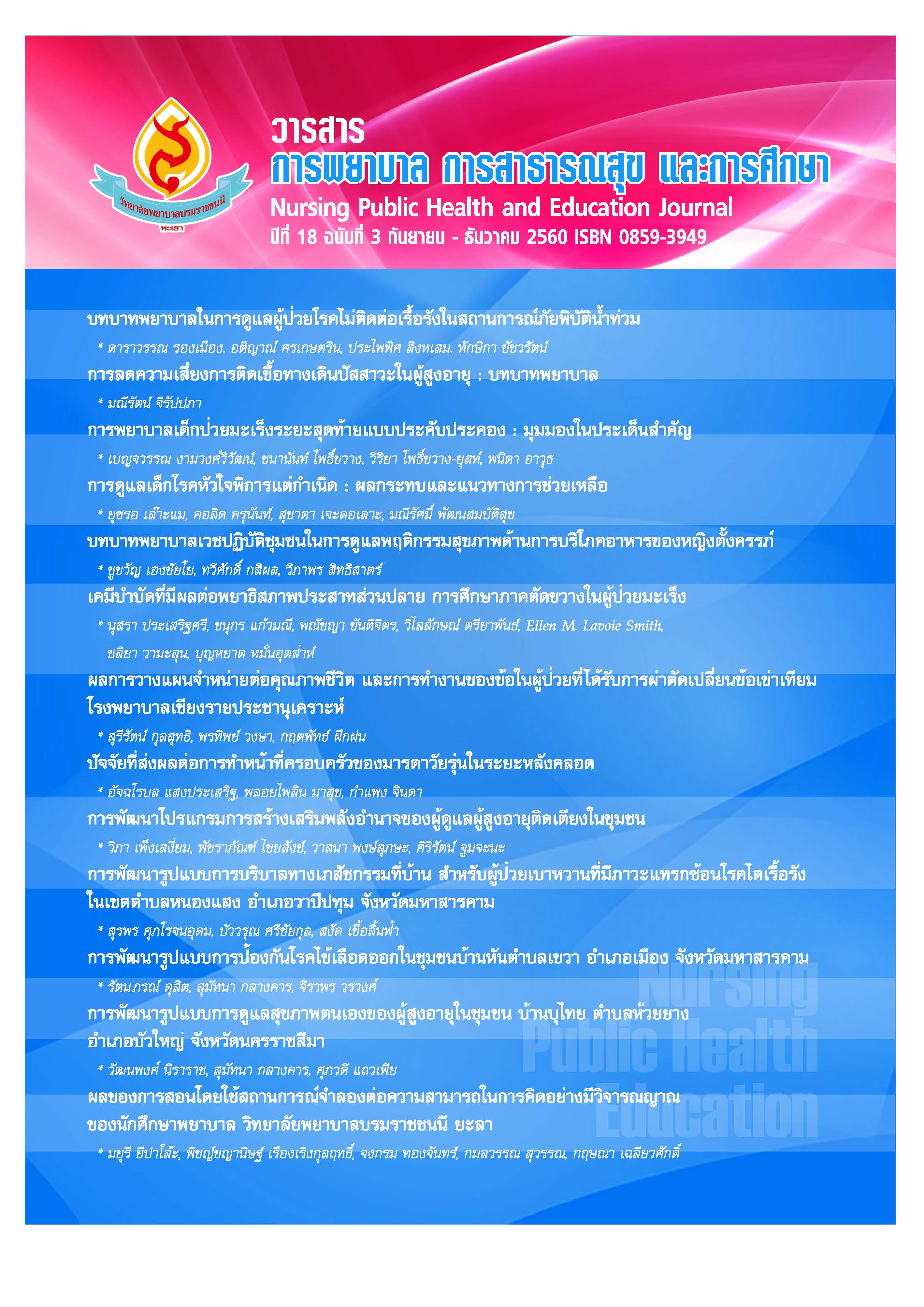การพัฒนาโปรแกรมการสร้างเสริมพลังอำนาจ ของผู้ดูแลผู้สูงอายุติดเตียงในชุมชน The Development of Caregiver’s Empowerment Program of bed bound Elderly in the Community
คำสำคัญ:
โปรแกรมการเสริมสร้างพลังอำนาจ, ผู้ดูแล, ผู้สูงอายุติดเตียง, Empowerment Program, Caregiver, bed bound Elderlyบทคัดย่อ
การวิจัยและพัฒนาครั้งนี้ มีวัตถุประสงค์เพื่อพัฒนาโปรแกรมการสร้างเสริมพลังอำนาจของผู้ดูแลผู้สูงอายุติดเตียง และทดสอบประสิทธิผลต่อพฤติกรรมการดูแลของผู้ดูแล ระยะการดำเนินงานมี 2 ระยะ คือ 1) การพัฒนาโปรแกรมโดยประยุกต์แนวคิดการเสริมสร้างพลังอำนาจร่วมกับการให้ความรู้และฝึกปฏิบัติการดูแลผู้สูงอายุติดเตียง และการสนับสนุนทางสังคม และ 2) การทดสอบโปรแกรม กลุ่มตัวอย่างจากอาสาสมัครที่เป็นผู้ดูแลผู้สูงอายุติดเตียงและยินดีเข้าร่วมการวิจัย โดยมีเกณฑ์ การคัดเข้า และเกณฑ์การคัดออก งานวิจัยนี้มีตัวอย่างสองกลุ่ม และมีขนาดเท่ากัน แบ่งเข้ากลุ่มทดลองและกลุ่มควบคุม กลุ่มละ 34 คน เครื่องมือของการวิจัยประกอบด้วย 1) โปรแกรมสร้างเสริมพลังอำนาจผู้ดูแล 2) แบบสัมภาษณ์เชิงลึก ตามแนวคำถามที่ผู้วิจัยสร้างขึ้น ร่วมกับการสังเกตพฤติกรรมแบบไม่มีส่วนร่วม 3) แบบวัดพลังอำนาจของผู้ดูแลผู้สูงอายุติดเตียง และ 4) แบบประเมินพฤติกรรมการปฏิบัติการดูแลผู้สูงอายุติดเตียงของผู้ดูแล สถิติที่ใช้ในการวิเคราะห์ข้อมูลได้แก่ การแจกแจงความถี่ ร้อยละ ค่าเฉลี่ย และส่วนเบี่ยงเบนมาตรฐาน ค่าสถิติ independent t-test และ paired t-test ผลการวิจัยพบ 1) จากการสัมภาษณ์ผู้ดูแลหลักของผู้สูงอายุติดเตียง ซึ่งส่วนใหญ่เป็นคู่สมรสและบุตร พบว่า ผู้ดูแลมีความสามารถในการดูแลค่อนข้างดีจากการประเมินการปฏิบัติกิจวัตรประจำวันในการดูแลผู้สูงอายุติดเตียง โดยอาศัยปัจจัยภายในครอบครัวเป็นพื้นฐานสำคัญส่งผลให้ผู้ป่วยมีความรู้สึกมั่นใจแสดงถึงความสัมพันธภาพค่อนข้างดี แต่การทำหน้าที่ระยะยาวส่งผลให้ประสบปัญหาหลายประการได้แก่ ด้านสุขภาพกาย สุขภาพจิต และปัญหาด้านการเงิน ซึ่งผู้ดูแลหลักต้องมีภาระดูแล ส่งผลให้มีความต้องการที่จะได้รับความช่วยเหลือแบ่งเบาภาระหน้าที่จากหน่วยงานภาครัฐ ภาคเอกชน กลุ่มเพื่อนบ้าน ผู้นำชุมชน และผู้นำศาสนา 2) ภายหลังการให้โปรแกรม 4 สัปดาห์ กลุ่มทดลองมีคะแนนเฉลี่ยพลังอำนาจของผู้ดูแลผู้สูงอายุติดเตียงและคะแนนพฤติกรรมการปฏิบัติการดูแลผู้สูงอายุติดเตียงของผู้ดูแลสูงกว่าก่อนให้โปรแกรม และสูงกว่ากลุ่มควบคุมอย่างมีนัยสำคัญทางสถิติ (p=0.000) ข้อเสนอแนะจากงานวิจัย ควรมีการติดตามผลของโปรแกรมในระยะยาวภายหลังการทดลองเพื่อศึกษาความคงทนของโปรแกรม และควรมีการศึกษาความสัมพันธ์ระหว่างการรับรู้พลังอำนาจกับพฤติกรรมการดูแลผู้สูงอายุติดเตียง
คำสำคัญ : โปรแกรมการเสริมสร้างพลังอำนาจ ผู้ดูแล ผู้สูงอายุติดเตียง
The purposes of this research and development were to develop the caregiver’s empowerment program of bed bound elderly, and to test its effectiveness on care behavior of caregiver. Two phases in cluded 1) the development of the caregiver’s empowerment program with an application of empowerment, education and training symptom management and social support, and 2) Program testing,. samples from volunteers who were caring for the elderly were bedridden and were willing to participate in the study, with criteria for selection and exclusion criteria. This research has two groups, the same size.and the experimental group; 34 of each. The control group received the routine care, whereas the experimental group received the caregiver’s empowerment program. The research tools consisted of 1) the caregiver’s empowerment program 2) In-depth interview was based on the researcher's question combined with observation of non-participatory behavior 3) The power of caregiver questionnaires 4) Behavioral behavior assessment form for elderly caregivers. Data were analyzed using frequency, percentage, mean, standard deviation, t-test independent and pair t-test. The results showed that 1) From the interview, the main caregivers of the elderly had a bed. Most of them are spouses and children, Caregivers are well cared for by assessing their daily routines in caring for the elderly. The caregiver is capable of caring quite well. Based on family factors, it is important for patients to feel confident about their relationship. However, long-term care had many problems, these include physical health, mental health, and financial issues. The primary caregiver is obliged to take care. As a result, there is a need to get help to ease the burden on government, private sector, neighbors, community leaders and religious leaders. 2) After the experimental program, the mean scores of the power of the caregivers, the elderly, the bedside and the behavior scores of the elderly caregivers were higher than before the program. And higher than the control group (p = 0.000). Suggestion Long-term follow-up of the program is recommended to determine the durability of the program and the relationship between perceived power and elderly care behaviors should be studied.
Keyword : Empowerment Program, Caregiver, bed bound Elderly



